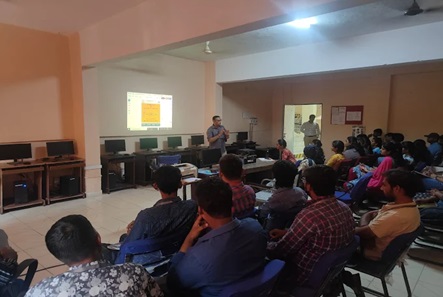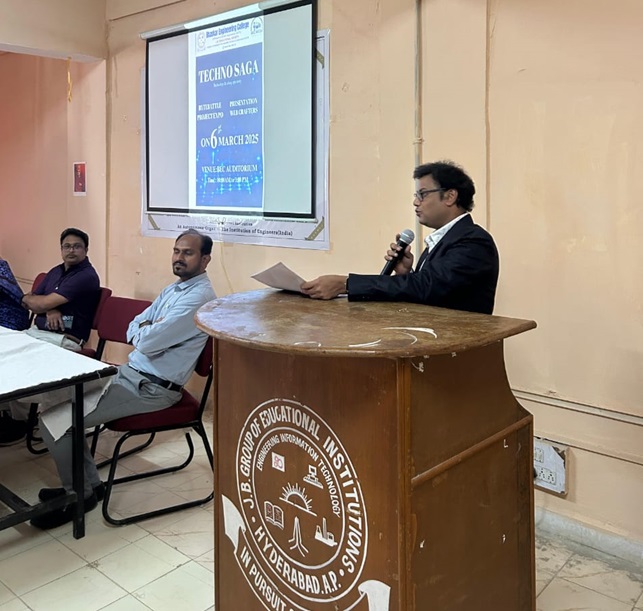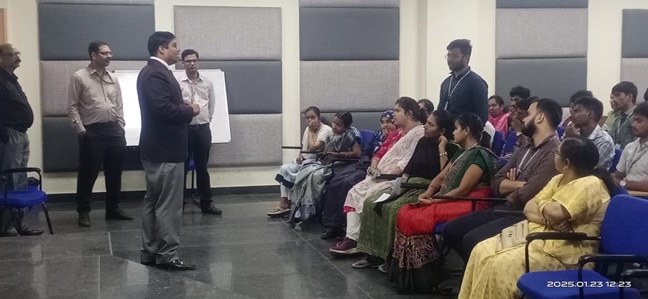Department Details
The Department of Artificial Intelligence & Machine Learning (AI & ML) at Bhaskar Engineering College was established in 2021 with an intake of 60 students, along with an additional 10% intake under the lateral entry scheme. Since its inception, the department has been committed to preparing students for the rapidly evolving tech landscape where AI and ML are transforming industries across the globe.
This specialized program blends a strong foundation in Computer Science Engineering with advanced training in AI/ML algorithms, tools, and techniques. Students gain hands-on experience through labs, projects, and real-world applications, ensuring they are industry-ready upon graduation.
The department also actively encourages participation in workshops, hackathons, internships, and research activities, fostering innovation and critical thinking. With a dedicated team of experienced faculty and a curriculum aligned to the latest industry needs, the department aims to shape future professionals who can lead and contribute to technological advancements.
Our graduates are well-equipped to pursue successful careers in AI, Data Science, Robotics, Computer Vision, Natural Language Processing, and more.
HOD-Profile

Mr. Shashank S
Mr. Shashank S is serving as the Head of the Department and Assistant Professor in the CSE (AI & ML) department at Bhaskar Engineering College. He holds a B.Tech and M.Tech in Computer Science and Engineering from JNTU Hyderabad.
With over 10 years of experience in the IT industry and academia, he effectively bridges practical knowledge with academic learning. He has actively participated in numerous technical workshops and Faculty Development Programs (FDPs) and has also contributed by conducting workshops for faculty and students.
His areas of interest include Artificial Intelligence, Machine Learning, and Data Science, and he ensures the curriculum remains aligned with evolving industry standards. Mr. Shashank is committed to the department’s academic growth and provides strong support in managing all departmental activities efficiently.
Vision & Mission
Vision
To impart quality education and human values for moulding students as competent professionals with knowledge of evolving technologies to meet the demands of industry and society.
Mission
To impart high Quality Technical & Professional education in order to mould the learners into globally competitive professionals who are professionally deft, intellectually adept and socially responsible. The Department of Artificial Intelligence and Data Science strives to make the learners inculcate and imbibe pragmatic perception and pro-active nature, so as to enable them to acquire a vision for exploration and an insight for advanced inquire.
Short/Long term Goals
Short term Goals
To conduct faculty development programs regularly for skill up-gradation
To modernize all the laboratories
To train and educate students as Global Citizens
To Place teaching / tutorial material of each subject on the internet to enable students to browse at their own place of learning.
To encourage the students to participate in community development programs.
To conduct summer and winter schools for faculty members and short-term course for technicians to widen their knowledge base and deepen their understanding of the latest trends and developments in field of Artificial Intelligence and Data Science.
Long term Goals
To be among top ten leading institutes in India and abroad and be recognized as the best department in terms of research and innovation.
To develop young professional graduates with strong foundational and practical knowledge in Artificial Intelligence and Data Science.
To provide high-quality technical and professional education in the field of Artificial Intelligence and Data Science that fosters creativity, analytical thinking, and interdisciplinary learning.
To establish and strengthen Industry-Institute interaction and be industry solution providers.
To cultivate a learning environment that encourages research, innovation, and continuous skill enhancement in emerging AI and DS technologies.
To promote a proactive and pragmatic mindset among learners, enabling them to explore, innovate, and lead advancements in artificial intelligence and data-centric technologies.
Professional Bodies
Engaging with professional organizations is crucial for students and faculty in the fields of Artificial Intelligence and Machine Learning. These bodies offer platforms for networking, knowledge exchange, and staying abreast of industry advancements.
1. Association for Computing Machinery (ACM) – SIGAI
The ACM Special Interest Group on Artificial Intelligence (SIGAI) is a global community dedicated to the advancement of AI principles and techniques. It organizes conferences, workshops, and publishes research to promote AI education and application.
2. Applied AI Association (AAIA)
AAIA empowers businesses and professionals to leverage AI through a global network, industry resources, and collaborative initiatives. It facilitates AI adoption by developing standards and connecting organizations to drive innovation and growth.
3. Computer Society of India (CSI)
Established in 1965, CSI is a national body representing computer professionals in India. It conducts conferences, seminars, and fosters collaboration among members to advance computer science and technology.
4. Indian Association for Medical Informatics (IAMI)
IAMI promotes the application of informatics in healthcare, bioscience, and medicine in India. It aims to sensitize the medical community to the benefits of Information Technology and encourages the development of computerized clinical records and medical digital libraries.
5. European Association for Artificial Intelligence (EurAI)
EurAI represents the European AI community, promoting the study, research, and application of AI. It organizes the European Conference on Artificial Intelligence (ECAI) and awards the Artificial Intelligence Dissertation Award to recognize significant contributions to the field.
6. International Federation for Information Processing (IFIP) – TC12
IFIP's Technical Committee 12 focuses on Artificial Intelligence, fostering the development and understanding of AI and its applications worldwide. It promotes interdisciplinary exchanges between AI and other fields of information processing.
Infrastructure
The department owns 250 latest computer systems with high configuration and upgraded software and maintains an exclusive lab with 1 to 1 ratio for each subject.
To foster innovation and excellence in Artificial Intelligence (AI) and Machine Learning (ML), our institution is committed to providing a robust and scalable infrastructure. This infrastructure is designed to support cutting-edge research, hands-on learning, and real-world applications in AI & ML.
Key Components of Our AI & ML Infrastructure
1. High-Performance Computing Resources
Graphics Processing Units (GPUs): Equipped with NVIDIA GPUs, our systems accelerate deep learning model training and inference tasks.
Tensor Processing Units (TPUs): Utilized for high-throughput computations, enhancing the efficiency of complex ML models.
Cloud Computing: Leveraging cloud platforms like AWS, Google Cloud, and Azure for scalable compute resources, enabling flexible and cost-effective access to computational power.
2. Advanced Data Storage and Management
Data Lakes and Warehouses: Implementing scalable solutions for storing structured and unstructured data, facilitating efficient data retrieval and analysis.
Data Processing Frameworks: Utilizing tools like Apache Hadoop and Apache Spark for data cleaning, transformation, and organization, ensuring high-quality datasets for model training.
3. Machine Learning Frameworks and Tools
TensorFlow and PyTorch: Providing comprehensive libraries for building, training, and deploying deep learning models.
Scikit-learn and Keras: Supporting traditional machine learning algorithms and simplifying the development of neural networks.
MLOps Platforms: Integrating tools for model deployment, monitoring, and maintenance, ensuring the reliability and scalability of AI applications
4. Collaborative and Flexible Learning Environments
AI Labs and Workspaces: Designing collaborative spaces equipped with modern computing resources, fostering teamwork and innovation.
Virtual Labs: Offering cloud-based environments that provide students and researchers with remote access to AI & ML tools and resources.
5. Security and Compliance
Data Privacy Measures: Implementing encryption protocols and access controls to protect sensitive data.
Compliance with Regulations: Ensuring adherence to data protection laws and institutional policies to maintain ethical standards in AI research and applications.
DETAILS OF LABORATORIES
The following are the laboratories with the state of the art equipment’s
|
S.no
|
Lab Name
|
|
1
|
Operating System Lab
|
|
2
|
Computer Networks and Web Technologies Lab
|
|
3
|
Compiler Design Lab
|
|
4
|
Machine Learning Lab
|
|
5
|
Mobile Application Development Lab
|
|
6
|
Network Programming Lab
|
|
7
|
Scripting Languages Lab
|
|
8
|
Android Application Development
|
|
9
|
Internet of Things
|
|
10
|
Linux Programming Lab
|
|
11
|
Python Programming Lab
|
|
12
|
R Programming Lab
|
|
13
|
Software Engineering Lab
|
|
14
|
Concurrent Programming Lab
|
|
15
|
Software Testing Methodologies Lab
|
|
16
|
Data Mining Lab
|
|
17
|
C++ Programming Lab
|
|
18
|
Data Structures Lab
|
|
19
|
Database Management Systems Lab
|
|
20
|
Java Programming Lab
|
|
21
|
IT Workshop Lab
|
The Department has excellent Departmental Library facility under Artificial Intelligence and Data Science.
STANDARD OPERATING PROCEDURE (SOP) FOR LAB IN-CHARGES
Research and Development
AI & ML Transforming R&D
1. Accelerated Drug Discovery
AI models analyze extensive chemical libraries to predict molecular interactions, identifying potential drug candidates more efficiently than traditional methods. For instance, Insilico Medicine utilized AI to design a novel drug for idiopathic pulmonary fibrosis in just 18 months .
2. Enhanced Clinical Trials
AI optimizes patient recruitment by analyzing genetic profiles and medical histories, ensuring participants match specific trial criteria. This approach not only speeds up the recruitment process but also improves the likelihood of trial success .
3. Predictive Maintenance in Manufacturing
By analyzing data from equipment sensors, AI forecasts maintenance needs, preventing unexpected breakdowns and reducing downtime. Pharmaceutical companies like Pfizer have implemented AI-driven predictive maintenance to enhance operational efficiency .
4. Supply Chain Optimization
AI models predict demand, manage inventory levels, and streamline logistics, ensuring efficient supply chain operations. Novartis employed AI to improve its supply chain logistics, leading to better inventory management and reduced costs .
5. Semantic Data Enrichment
AI aids in transforming unstructured data, such as scientific literature and experimental notes, into structured formats. This process involves annotating and tagging data with relevant concepts, enhancing its usability for research purposes .
Sector-Specific Applications
Pharmaceuticals
-
Drug Design & Discovery: AI algorithms predict molecular structures and properties, identifying druggable targets.
-
Clinical Trials: AI optimizes patient recruitment and monitors trial progress in real-time.
-
Manufacturing: AI enhances production processes through automation and quality control.
Healthcare
Materials Science
-
Materials Discovery: AI models predict properties of new materials, accelerating the development of innovative substances.
-
Quality Control: AI inspects materials for defects and ensures consistency in production .
Strategic Benefits
-
Efficiency: Reduces time and costs associated with traditional R&D processes.
-
Accuracy: Enhances precision in data analysis and decision-making.
-
Innovation: Facilitates the discovery of novel solutions and products.
-
Scalability: Enables rapid scaling of successful R&D outcomes.
Seminars
Seminar/Workshops Attended
Advanced AI & ML Projects
1. 3D Medical Imaging Analysis
Build a deep learning model to detect anomalies in MRI or CT scans. Utilize 3D U-Net architectures to enhance accuracy in identifying tumors or internal bleeding.
2. Edge AI for Precision Farming
Implement small machine learning models on drones or robots to monitor crops, detect pests, and offer irrigation recommendations in low-connectivity environments. Use hardware platforms like NVIDIA Jetson for real-time processing.
3. Autonomous Underwater Drone Navigation
Design an underwater robot that uses sonar or depth sensors, combined with reinforcement learning, to navigate around obstacles. This project integrates robotics technology with sensor fusion techniques for marine exploration.
4. Fraud Detection in Financial Transactions
Develop a system that analyzes transaction patterns to identify anomalies indicative of fraudulent activities. Utilize machine learning algorithms like Random Forests or Logistic Regression for real-time fraud detection.
5. AI-Based Language Translator
Create a multilingual translation tool using machine learning models for real-time communication. Implement sequence-to-sequence models and NLP techniques to facilitate global collaboration.
Highlighting Real-World Applications
These projects not only demonstrate the versatility of AI and ML but also address practical challenges across various industries. By featuring such projects on your website, you can showcase your expertise and commitment to leveraging cutting-edge technologies for impactful solutions.
Achievements
FACULTY ACHIEVEMENTS
Will be updated soon...
Best Projects
Will be updated soon...









